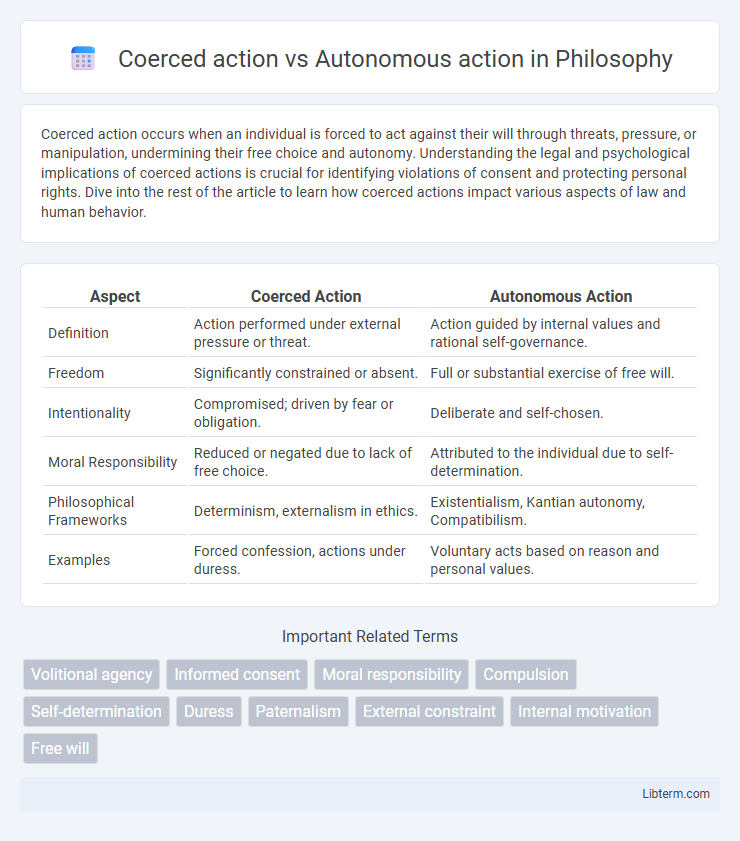Coerced action occurs when an individual is forced to act against their will through threats, pressure, or manipulation, undermining their free choice and autonomy. Understanding the legal and psychological implications of coerced actions is crucial for identifying violations of consent and protecting personal rights. Dive into the rest of the article to learn how coerced actions impact various aspects of law and human behavior.
Table of Comparison
| Aspect | Coerced Action | Autonomous Action |
|---|---|---|
| Definition | Action performed under external pressure or threat. | Action guided by internal values and rational self-governance. |
| Freedom | Significantly constrained or absent. | Full or substantial exercise of free will. |
| Intentionality | Compromised; driven by fear or obligation. | Deliberate and self-chosen. |
| Moral Responsibility | Reduced or negated due to lack of free choice. | Attributed to the individual due to self-determination. |
| Philosophical Frameworks | Determinism, externalism in ethics. | Existentialism, Kantian autonomy, Compatibilism. |
| Examples | Forced confession, actions under duress. | Voluntary acts based on reason and personal values. |
Understanding Coerced Action
Coerced action involves behavior compelled by external pressure or threats, overriding an individual's free will and decision-making autonomy. Understanding coerced action requires analyzing the psychological and social mechanisms that restrict voluntary choice, such as force, manipulation, or authority imposition. This distinction is crucial in fields like law, ethics, and psychology, where assessing the validity of consent or moral responsibility hinges on recognizing the presence of coercion.
Defining Autonomous Action
Autonomous action refers to self-initiated behavior driven by an individual's internal motivations, goals, and values without external pressure or influence. It embodies volition, where decision-making arises from personal agency and conscious reflection, signifying true self-governance. Distinct from coerced action, autonomous action involves deliberate choice, reinforcing accountability and authenticity in ethical and psychological contexts.
Key Differences Between Coercion and Autonomy
Coerced action involves behavior driven by external pressure or threats, limiting an individual's freedom of choice, while autonomous action reflects self-governed decisions made independently without undue influence. Key differences include the source of motivation--external force in coercion versus internal volition in autonomy--and the extent of personal freedom, where coercion diminishes agency and autonomy enhances self-determination. These distinctions shape ethical, legal, and psychological interpretations of human behavior and responsibility.
Psychological Effects of Coerced Action
Coerced action often results in significant psychological distress, including feelings of helplessness, anxiety, and diminished self-esteem. Individuals subjected to coercion may experience long-term trauma, such as post-traumatic stress disorder (PTSD) and impaired decision-making capabilities. Unlike autonomous action, which fosters a sense of agency and psychological well-being, coerced action disrupts personal autonomy and can lead to a pervasive sense of powerlessness and emotional conflict.
Benefits of Autonomous Decision-Making
Autonomous decision-making enhances individual accountability and fosters innovation by enabling people to act based on their judgment and expertise. It promotes faster problem-solving and adaptability in dynamic environments, increasing organizational efficiency. Empowering autonomy also boosts motivation and satisfaction, leading to improved performance and sustained growth.
Factors Influencing Coerced Choices
Factors influencing coerced choices include power dynamics where authority figures impose demands, limiting an individual's sense of control and freedom. Psychological pressure, such as fear of punishment or social exclusion, significantly impacts the likelihood of an action being coerced rather than autonomous. External circumstances, like legal constraints or economic dependency, further restrict genuine autonomy by forcing compliance under duress.
Societal Impacts of Limited Autonomy
Limited autonomy resulting from coerced actions profoundly affects societal well-being by eroding individual agency and undermining social trust. Communities experiencing widespread coercion often face increased social unrest, reduced innovation, and weakened democratic participation. Such constraints impede personal development and can perpetuate systemic inequalities, hindering societal progress and resilience.
Real-World Examples of Coerced vs Autonomous Actions
Coerced actions occur when individuals perform tasks under pressure or threats, such as employees forced to meet unrealistic quotas to avoid job loss, whereas autonomous actions arise from voluntary decisions reflecting personal values, like an entrepreneur choosing to launch a sustainable business. In legal contexts, coerced confessions obtained through intimidation contrast sharply with autonomous admissions made willingly during interrogations. Real-world examples highlight the ethical and psychological distinctions between actions driven by external compulsion and those motivated by internal choice.
Promoting Autonomy in Everyday Life
Promoting autonomy in everyday life involves encouraging individuals to make decisions based on personal values and preferences rather than external pressures or coerced actions. Autonomous action enhances intrinsic motivation, psychological well-being, and a sense of ownership over one's choices, leading to more sustainable and fulfilling outcomes. Strategies such as providing meaningful options, respecting individual perspectives, and fostering self-reflection support the development of autonomous behavior in daily routines.
Ethical Implications of Coercion and Autonomy
Coerced actions undermine moral responsibility by compromising an individual's free will, raising significant ethical concerns about consent and justice. Autonomous actions, rooted in self-governance and informed decision-making, are fundamental to respecting individual dignity and human rights. Ethical frameworks prioritize autonomy as essential for accountability and moral agency, while coercion often leads to violations of personal freedom and ethical exploitation.
Coerced action Infographic

 libterm.com
libterm.com